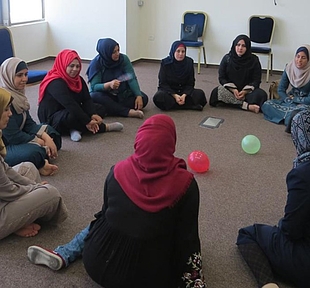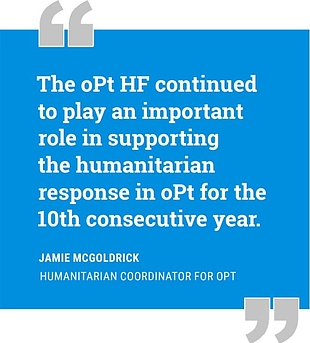Foreword to the report of the Humanitarian Fund for 2017
By Jamie McGoldrick, Humanitarian Coordinator for OPT
2017 marked the 50th year of Israeli military occupation of the West Bank, including East Jerusalem, and the Gaza Strip. Humanitarian needs throughout the occupied Palestinian territory (OPT) remain extensive, particularly in the Gaza Strip.
 Soaring unemployment, low household incomes, the elevated cost of living (particularly for food) and the erosion of livelihoods have resulted in continued high levels of food insecurity in the OPT; an estimated 1.6 million people need health and nutrition support, and 1.9 million people require some form of protection assistance. A pervasive crisis of accountability continues, with no effective remedy for the vast majority of alleged violations of international law driving this protracted protection crisis.
Soaring unemployment, low household incomes, the elevated cost of living (particularly for food) and the erosion of livelihoods have resulted in continued high levels of food insecurity in the OPT; an estimated 1.6 million people need health and nutrition support, and 1.9 million people require some form of protection assistance. A pervasive crisis of accountability continues, with no effective remedy for the vast majority of alleged violations of international law driving this protracted protection crisis.
In 2017, conditions further deteriorated in the Gaza Strip, in particular, its chronic energy crisis, exacerbating an already-fragile humanitarian situation as a consequence of the further deepening of the internal Palestinian political divide on top of the 10 years of Israeli blockade and periodic escalations of hostilities.
In the West Bank, demolitions of residential and livelihood structures, restrictions on movement, limited access to natural resources and other measures, continued to generate a coercive environment, putting pressure on households and generating a risk of forcible transfer for many Palestinians in Area C, East Jerusalem and the H2 part of Hebron city.
 For the 10th consecutive year, the OPT Humanitarian Fund (OPT HF) continued to play an important role in supporting the humanitarian response; this is particularly important in light of the progressive reduction in the level of funding for the Humanitarian Response Plan (HRP), which jeopardizes the delivery of critical assistance for those in need across the OPT. Thanks to the continued and generous contributions of Belgium, Germany, Iceland, Ireland, Italy, Malta, Norway, Spain, Sweden, and Turkey, the Fund succeeded in allocating $11.7 million for the implementation of 43 emergency projects, reaching over six million people in need. Furthermore, two new donor countries, Malta and Turkey, contributed to the OPT HF for the first time, with Turkey’s contribution its first to any pooled fund globally.
For the 10th consecutive year, the OPT Humanitarian Fund (OPT HF) continued to play an important role in supporting the humanitarian response; this is particularly important in light of the progressive reduction in the level of funding for the Humanitarian Response Plan (HRP), which jeopardizes the delivery of critical assistance for those in need across the OPT. Thanks to the continued and generous contributions of Belgium, Germany, Iceland, Ireland, Italy, Malta, Norway, Spain, Sweden, and Turkey, the Fund succeeded in allocating $11.7 million for the implementation of 43 emergency projects, reaching over six million people in need. Furthermore, two new donor countries, Malta and Turkey, contributed to the OPT HF for the first time, with Turkey’s contribution its first to any pooled fund globally.
In 2017, the Fund was able to utilize its available resources to improve the efficiency of the humanitarian response, by directing funding towards the most urgent, priority humanitarian needs, through an inclusive process that includes all stakeholders, with strong participation of national actors. The OPT HF continues to be a valuable tool to leverage the leadership of the HC and activate the humanitarian architecture to meet needs, in close collaboration with the Fund’s donors locally. With support from the OCHA OPT Country Office, this relatively small Fund has been able to ensure the greatest benefit to the largest number of beneficiaries in need.
In the years to come, the Fund should be able to increase its impact, growing in scale to cover up to 10 per cent of the HRP request in any given year. This will enable us to more strategically use the fund to address the needs of those Palestinians most impacted by the protracted protection crisis in the OPT.










